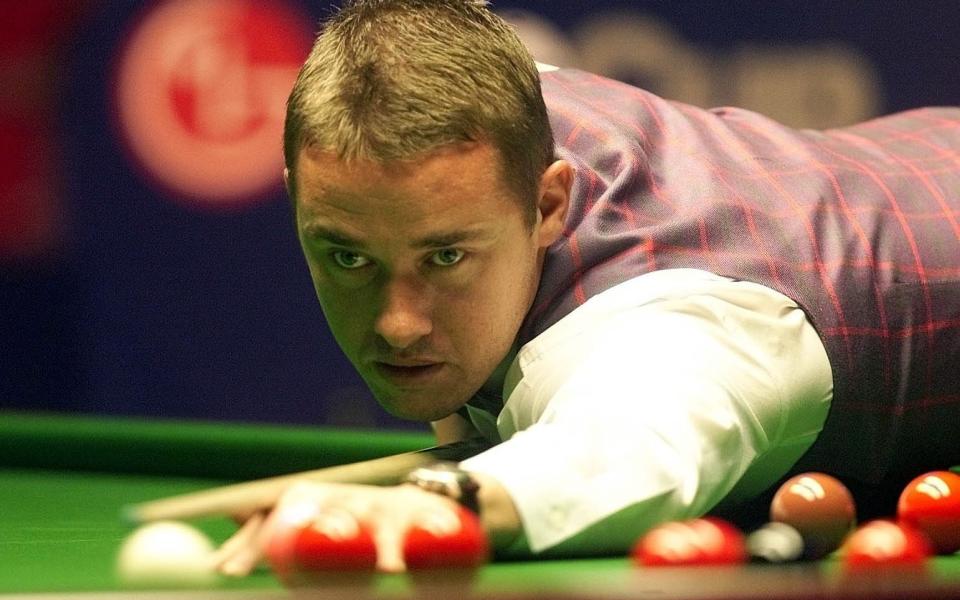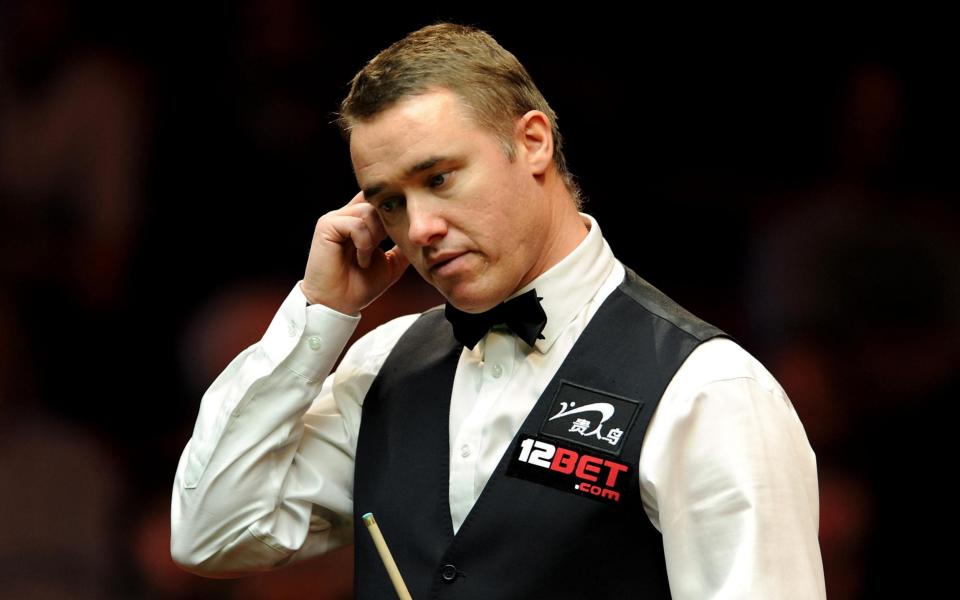'You never lose that desire': Stephen Hendry on his comeback - and a wish to script a different ending

Stephen Hendry was on the golf course with Barry Hearn when the promoter, channelling his signature chutzpah, seized the moment to coax the seven-time world champion out of retirement. “Mark Williams and I were playing a game against Barry and Steve Davis,” he recalls. “Barry came up to me and asked, ‘Why don’t you have a two-year tour wildcard?’ Jimmy White has one, so does Ken Doherty. You’re playing a bit better.’ ‘Yeah, I was thinking about it,’ I said. ‘Maybe not quite yet, though.’ ‘Take your time,’ he replied.” But he knew from experience that time, in Hearn’s frenetic world, was a relative concept. “‘Just let me know tomorrow.’”
And so here we are, 48 hours out from Hendry’s momentous return to the sport he once bestrode. At 52, he is wary of inflating expectations about how he will perform, conscious that he needs to win four qualifying matches simply to return to the Crucible, a stage that he could call his own in the Nineties. The Gibraltar Open is not, it would be fair to say, quite the platform he had in mind for such an emotionally-charged comeback. In the age of Covid travel restrictions, snooker has become essentially a sport in exile, with five of its six ranking events so far in 2021 staged inside a bio-secure arena in Buckinghamshire.
“Milton Keynes with no crowd? It’s clearly not going to be the atmosphere that I was looking for,” Hendry says. “I’m not able to practice, either. Due to Covid rules, they only allow those involved in the previous tournament to be on the tables. So, I’ll be going in cold.” You might imagine that the organisers could conjure up an exemption for arguably the sport’s greatest name, a man who lost three matches in a decade at the world championship, but these are chastening times all round.
Still, Hendry is finding reasons to be optimistic. A crucial reason why he felt compelled to test himself after almost a nine-year absence lies in his partnership with coach Stephen Feeney, whose renowned sighting methods helped steer Mark Williams to a third world title aged 43, and Ronnie O’Sullivan to a sixth Crucible triumph last summer. “Mark told me, ‘Have a look with Stephen and see what happens. What have you got to lose? Stephen asked me what I wanted from it. I explained that I was just hoping to enjoy snooker again, whether it was in an exhibition or down at the local club.”

The more he learned from Feeney, the more the scar tissue from 2012 – a time when Hendry characterises his game as “shot to pieces” – fell away. “Quickly, the technical details started to click,” he explains. “When I was young, I was very slim. But I’ve put on a bit of timber, and so when I get down, the cue doesn’t fall on the same line that it used to.
“It’s about re-learning how to sight the cue ball. Some players have dominant eyes, right or left, but I’m straight down the middle. I had lapsed into favouring one side, so much so that my cue was almost over my right eye. That’s completely wrong for me. When you’re aiming correctly, you’re sighting the ball better, and all of a sudden, the pots are going in the middle of the pockets. The big question is, ‘Can I reproduce it out there in the arena?’ That’s what made me do it, to see how I would fare.”
Great day with the 7x @SHendry775
His trademark pack split always spot on #perfectsightingandalignment #step #stance #cueaction #timing #accuracy #cueballcontrol #sightrightmethods@SRCueSports https://t.co/GV1JC7Gxx4 pic.twitter.com/QP2JHxC3AP— SightRight (@SightRightUK) February 16, 2021
A similarly powerful motivation for Hendry is the desire to script a different ending, to purge the feelings of vulnerability that once haunted him. It is a faintly miraculous detail of the world championship in 2012, his last professional tournament, he recorded his 11th 147 break, despite despairing of his cue action. “Out of 36 pots, I only made half a dozen the way I wanted,” he reflects. “It was sheer concentration that got the maximum done.” A subsequent 13-2 defeat to Stephen Maguire, a match in which he admits to having “given up halfway through”, convinced him to step away for good.
At his zenith, Hendry’s invincibility arose from his sheer comfort in being a champion, to the point where he held the No 1 ranking for eight unbroken years. “Whether it was about massaging my ego, I’m not sure, but I just loved the fact that people were talking about me as the best player in the world,” he says. “I loved being introduced as No 1. I was greedy for success. Sometimes even winning was an anti-climax. That’s why I never showed a lot of emotion when I won, because to me, it was my job.”
As such, his period of decline in the early 2010s gnawed away at his soul. In particular, the ordeal of losing repeatedly in the early rounds in China, a country where he would be heralded as the emperor of snooker and besieged for autographs, was a torment. “I was bereft of confidence, and it brings even more pressure when a crowd is cheering you on and you can’t produce for them. You end up trying to play well for the wrong reasons. You’re trying to impress people, not simply to win the tournament. I was respected so much out there, and there was this huge feeling of letting people down.”

Hendry is adamant that this time, he will not dial up his hopes too far, too quickly, given that he is only practising a couple of hours a day, rather than the five or six for which he was once renowned. Still, O’Sullivan, his great rival and antagonist, wonders aloud how long this equilibrium will last. The theory among Hendry’s peers is that as soon as he tastes success again, his appetite for more could be all-consuming. “The animal that I was, I got my enjoyment from winning,” he acknowledges. “Steve Davis, who went on longer than me, insisted that he was just using the game as a day out. But I always said, ‘If I can’t compete, then I’m not enjoying it.’ That’s going to be a conundrum for me with this comeback.”
He observes the same trait in Jimmy White, whom he famously beat in four of five world finals between 1990 and 1994. Every spring for the past 14 years, White has turned up for the gruelling qualifying event, desperate for a tilt at the one crown he never claimed, only to lose each time. “Perhaps he just wants it too much,” Hendry suggests. “And if you fall into that category, you’re not going to be able to perform.”
With this in mind, Hendry cautions that his own path back to the Crucible will be “horrifically difficult”. Even so, a few glimpses remain of the fearsomely high standards of old. It does not escape his attention, for example, that O’Sullivan has a chance this year to achieve a seventh world title, emulating a record he used to believe would never be equalled. “There are three records of which I’m quite protective: the seven world titles, the seven centuries in one final, and being the youngest ever world champion,” he says. “If Ronnie got to seven, I wouldn’t be happy about it. It’s human nature, I suppose.”
For all that Hendry has filled the competitive void with everything from commentary stints to promotional duties for Chinese pool, the dearth of playing snooker left an itch that ultimately could not go unscratched. “I don’t think you ever lose that desire,” he concedes. “You don’t lose the feeling of wishing you were out there with a cue instead of a microphone. The trouble is, I’ve not had a long time ‘in the pit’, as my old coach Frank Callan used to call it. But what matters to me is that I’m enjoying it.” It is too much to ask, surely, that the duels with O’Sullivan will be redrawn any time soon. It is simply a priceless boon for his sport that he has rejoined the fray at all.

 Yahoo News
Yahoo News 